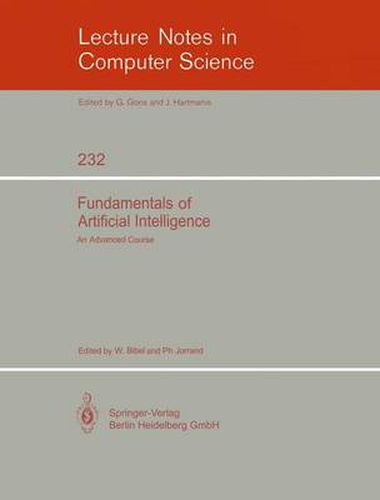Readings Newsletter
Become a Readings Member to make your shopping experience even easier.
Sign in or sign up for free!
You’re not far away from qualifying for FREE standard shipping within Australia
You’ve qualified for FREE standard shipping within Australia
The cart is loading…






This title is printed to order. This book may have been self-published. If so, we cannot guarantee the quality of the content. In the main most books will have gone through the editing process however some may not. We therefore suggest that you be aware of this before ordering this book. If in doubt check either the author or publisher’s details as we are unable to accept any returns unless they are faulty. Please contact us if you have any questions.
This volume contains the elaborated and harmonized versions of seven lectures given at the first Advanced Course in Artificial Intelligence, held in Vignieu, France, in July 1985. Most of them were written in tutorial form; the book thus provides an extremely valuable guide to the fundamental aspects of AI. In the first part, Delgrande and Mylopoulos discuss the concept of knowledge and its representation. The second part is devoted to the processing of knowledge. The contribution by Huet shows that both computation and inference or deduction are just different aspects of the same phenomenon. The chapter written by Stickel gives a thorough and knowledgeable introduction to the most important aspects of deduction by some form of resolution. The kind of reasoning that is involved in inductive inference problem solving (or programming) from examples, and in learning, is covered by Biermann. The tutorial by Bibel covers the more important forms of knowledge processing that might play a significant role in common sense reasoning. The third part of the book focuses on logic programming and functional programming. Jorrand presents the language FP2, where term rewriting forms the basis for the semantics of both functional and parallel programming. In the last chapter, Shapiro gives an overview of the current state of concurrent PROLOG.
$9.00 standard shipping within Australia
FREE standard shipping within Australia for orders over $100.00
Express & International shipping calculated at checkout
This title is printed to order. This book may have been self-published. If so, we cannot guarantee the quality of the content. In the main most books will have gone through the editing process however some may not. We therefore suggest that you be aware of this before ordering this book. If in doubt check either the author or publisher’s details as we are unable to accept any returns unless they are faulty. Please contact us if you have any questions.
This volume contains the elaborated and harmonized versions of seven lectures given at the first Advanced Course in Artificial Intelligence, held in Vignieu, France, in July 1985. Most of them were written in tutorial form; the book thus provides an extremely valuable guide to the fundamental aspects of AI. In the first part, Delgrande and Mylopoulos discuss the concept of knowledge and its representation. The second part is devoted to the processing of knowledge. The contribution by Huet shows that both computation and inference or deduction are just different aspects of the same phenomenon. The chapter written by Stickel gives a thorough and knowledgeable introduction to the most important aspects of deduction by some form of resolution. The kind of reasoning that is involved in inductive inference problem solving (or programming) from examples, and in learning, is covered by Biermann. The tutorial by Bibel covers the more important forms of knowledge processing that might play a significant role in common sense reasoning. The third part of the book focuses on logic programming and functional programming. Jorrand presents the language FP2, where term rewriting forms the basis for the semantics of both functional and parallel programming. In the last chapter, Shapiro gives an overview of the current state of concurrent PROLOG.